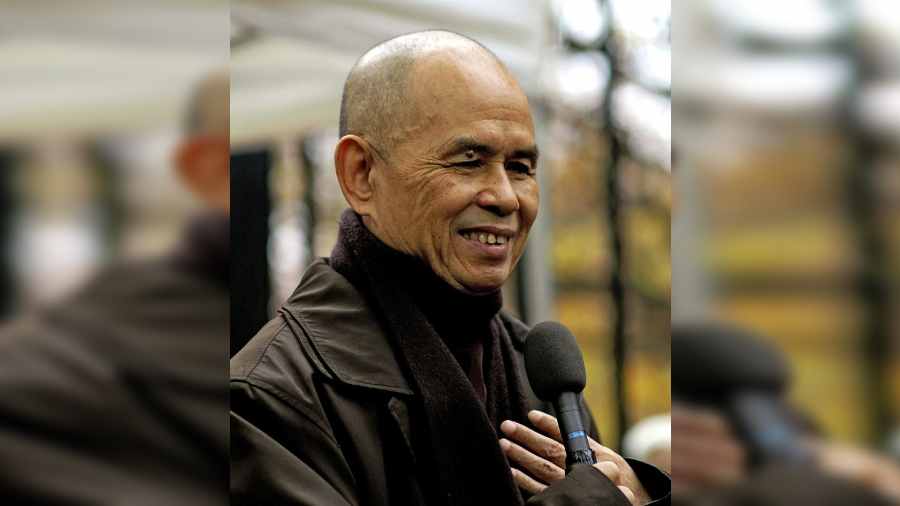Thich Nhat Hanh, a Vietnamese Buddhist monk who was one of the world’s most influential Zen masters, spreading messages of mindfulness, compassion and non-violence, died on Saturday at his home in the Tu Hieu Temple in Hue, Vietnam. He was 95.
The death was announced by Plum Village, his organisation of monasteries. He suffered a severe brain hemorrhage in 2014 that left him unable to speak, though he could communicate through gestures.
A prolific author, poet, teacher and peace activist, Thich Nhat Hanh was exiled from Vietnam after opposing the war in the 1960s and became a leading voice in a movement he called “engaged Buddhism”, the application of Buddhist principles to political and social reform.
Travelling widely on speaking tours in the US and Europe, Thich Nhat Hanh (pronounced tik nyaht hahn) was a major influence on western practices of Buddhism, urging the embrace of mindfulness, which his website describes as “the energy of being aware and awake to the present moment”.
In his book Peace Is Every Step: The Path of Mindfulness in Everyday Life, he wrote: “If we are not fully ourselves, truly in the present moment, we miss everything.”
His following grew as he established dozens of monasteries and practice centres around the world. The original Plum Village, near Bordeaux in southwest France, is the largest of his monasteries and is visited by thousands every year.
In 2018, he returned home to Hue, in central Vietnam, to live out his last days at the Tu Hieu Temple, where he had become a novice as a teenager.
Thich Nhat Hanh dismissed the idea of death. “Birth and death are only notions,” he wrote in his book “No Death, No Fear.” “They are not real.”
He added: “The Buddha taught that there is no birth; there is no death; there is no coming; there is no going; there is no same; there is no different; there is no permanent self; there is no annihilation. We only think there is.”
His connection with the US began in the early 1960s, when he studied at Princeton University and later lectured at Cornell and Columbia. He influenced the American peace movement, urging the Rev. Dr Martin Luther King Jr to oppose the Vietnam War.
Dr King nominated him for the Nobel Peace Prize in 1967, but the prize was not awarded to anyone that year. “I do not personally know of anyone more worthy than this gentle monk from Vietnam,” Dr King wrote to the Nobel Institute in Norway. “His ideas for peace, if applied, would build a monument to ecumenism, to world brotherhood, to humanity.”
Thich Nhat Hanh was born Nguyen Xuan Bao in Hue on October 11, 1926. He joined a Zen monastery at 16 and studied Buddhism there as a novice.
In the early 1960s, he founded Youth for Social Services, a grass-roots relief organisation in what was then South Vietnam.
Thich Nhat Hanh took up residence in France when the South Vietnamese government denied him permission to return after the signing of the Paris Peace Accords in 1973.
He was unable to return to Vietnam until 2005, when the Communist government allowed him to teach, practise and travel throughout the country. His antiwar activism continued, and in a talk in Hanoi in 2008 he said the Iraq war had resulted from fear and misunderstanding in which violence fed on itself.
“We know very well that airplanes, guns and bombs cannot remove wrong perceptions,” he said. “Only loving speech and compassionate listening can help people correct wrong perceptions. But our leaders are not trained in that discipline, and they rely only on the armed forces to remove terrorism.”
New York Times News Service










